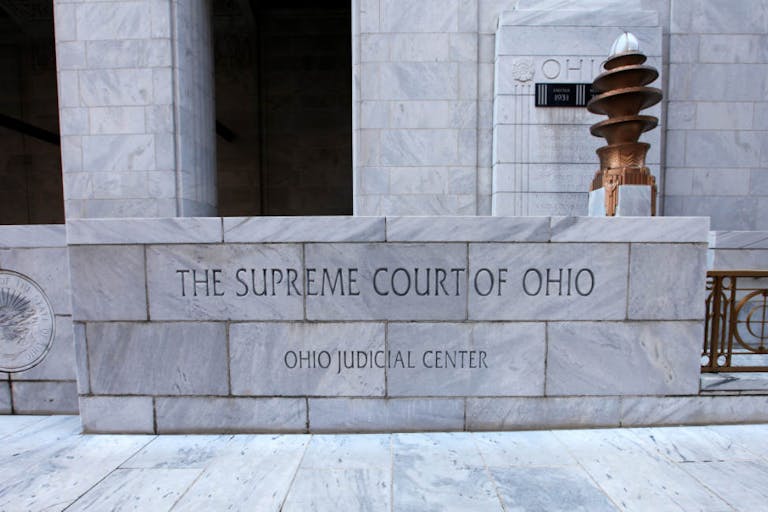
EU Parliament votes in favor of abortion travel fund
Bridget Sielicki
·
Ohio Supreme Court to weigh law protecting preborn humans with detectable heartbeats
The Ohio Supreme Court has begun hearing arguments on the state’s law protecting preborn children from abortion after a heartbeat can be detected — usually at about six weeks gestation.
In 2019, the law was initially passed, only for a federal court judge to block it. When Roe v. Wade was overturned last summer, it was briefly reinstated, only for Judge Christian Jenkins to issue an indefinite injunction against it in October. “Abortion is safe health care to which Ohioans have a right,” he wrote, adding, “It is simply wrong to state, as many do, that a right does not exist because it is not specifically listed in the constitution.”
Attorney General Dave Yost requested that the 1st District Court of Appeals overturn the ruling; when they declined, he asked the state Supreme Court to step in. They agreed to consider two legal issues: Jenkins’ order blocking the heartbeat law, and whether or not abortion facilities have legal standing to challenge the law on behalf of their patients.

Justice Pat Fischer questioned attorney Jessie Hill, who is representing Ohio abortion facilities, why Ohio women can’t sue the state themselves, and need abortion facilities to sue on their behalf — and pointed out that, by this logic, other people can sue on the issue of abortion as well.
“If it’s that broad of standing, why wouldn’t then a grandparent or a putative father have standing to oppose the abortion?” she said. “Couldn’t a grandparent of the putative child or a putative father of the child have that same standing to save that child’s life?”
Article continues below
Dear Reader,
In 2026, Live Action is heading straight where the battle is fiercest: college campuses.
We have a bold initiative to establish 100 Live Action campus chapters within the next year, and your partnership will make it a success!
Your support today will help train and equip young leaders, bring Live Action’s educational content into academic environments, host on-campus events and debates, and empower students to challenge the pro-abortion status quo with truth and compassion.
Invest in pro-life grassroots outreach and cultural formation with your DOUBLED year-end gift!
Additionally, Justice Pat DeWine questioned whether or not local judges should be able to block state laws so easily. “Your conception of final orders seems to give a trial court judge in one county extraordinary powers to enjoin a law and the judge in Meigs County could say that all of Ohio’s housing discrimination laws are unconstitutional, schedule a trial that’s going to last a couple of years and the state wouldn’t be able to appeal,” she said. “Are there any limits to that?”
Ohio Solicitor General Benjamin Flowers agreed that this issue impacts more than abortion.
“This argument is not about abortion. It’s about much broader issues,” Flowers said. “If they’re right, we have no basis for appealing those flagrantly unconstitutional decisions once the injunction issues. So what they are really seeking is a special rule for abortion, and that’s exactly the kind of jurisprudence that destroyed irreparably the U.S. Supreme Court’s reputation. We ask this court not to follow the same path.”
The state is also arguing that abortion facilities have no claim to standing and cannot establish a third-party claim. For a third-party claim to be valid, the third parties must demonstrate that their rights are interconnected with the rights of those directly affected — and Flowers said that allowing abortionists to sue on behalf of women violates current principles of standing. “What they’re really seeking is an exception for abortion,” Flowers said.
If the court rules in favor of Yost, the law will be allowed to take effect, though a ballot referendum will take place in November, in which voters can choose to enshrine abortion as a “right” in the state constitution.
Live Action News is pro-life news and commentary from a pro-life perspective.
Contact editor@liveaction.org for questions, corrections, or if you are seeking permission to reprint any Live Action News content.
Guest Articles: To submit a guest article to Live Action News, email editor@liveaction.org with an attached Word document of 800-1000 words. Please also attach any photos relevant to your submission if applicable. If your submission is accepted for publication, you will be notified within three weeks. Guest articles are not compensated (see our Open License Agreement). Thank you for your interest in Live Action News!

Bridget Sielicki
·
International
Bridget Sielicki
·
International
Cassy Cooke
·
Pop Culture
Cassy Cooke
·
Human Interest
Nancy Flanders
·
International
Bridget Sielicki
·
International
Cassy Cooke
·
Pop Culture
Cassy Cooke
·
Politics
Cassy Cooke
·
Politics
Cassy Cooke
·
Pop Culture
Cassy Cooke
·